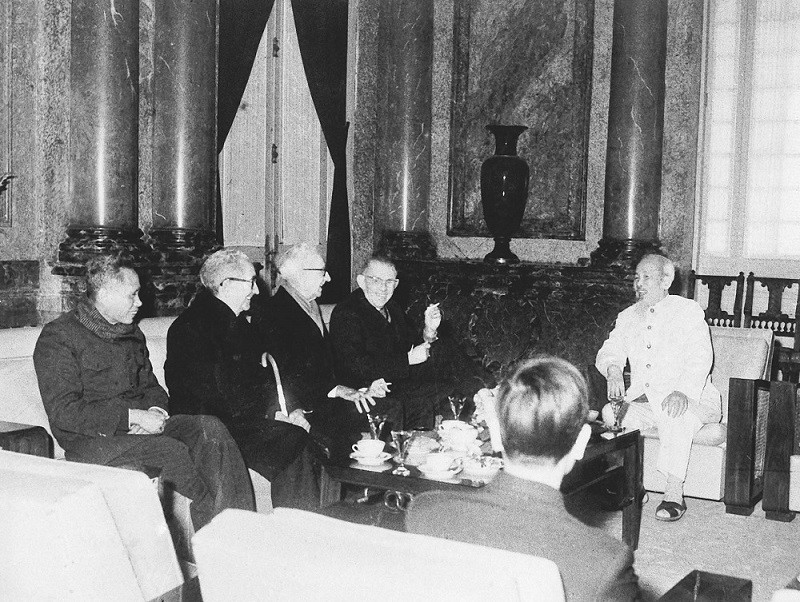
Untold stories of Uncle Ho and two American ‘envoys’
Latest
 |
| Uncle Ho received the American intellectual personalities in Viet Nam on January 17, 1967. (Source: Hochiminh.vn) |
Most people knows that the Viet Nam-US relations have gone through many ups and downs. For his part, President Ho Chi Minh also repeatedly expressed his desire for a better relationship with the US. Can you share your view on this?
The stories about President Ho Chi Minh and the US have been widely covered by the domestic and international press. On this occasion, I just want to share a small story that the American press once extensively covered at the beginning of 1967. As Viet Nam-US relations went through rough patches in 1960s, President Ho Chi Minh continued to show his goodwill towards the American people and remained optimistic about the bilateral relations. His meeting with American “envoys”, activists H.S. Hasmaurer and W.C. Bach of Center for the Study of Democratic Institutions (US) on January 12, 1967 was a clear example of this spirit.
At that time, the war continued to rage on. As a result, this was among rare visits approved the US Government. The two envoys came to Viet Nam without a responsibility to negotiate, but rather to check on possibility for other solutions. However, as they were in Hanoi, their trips have been disclosed when journalist Harrison Salisbury of New York Times (US) received permission to visit Hanoi on January 6, 1967.
Immediately after landing in the US, they shared their unique experience through articles, which attracted attentions from major new outlets and CBS News (US). Later on, two renowned Pulitzer authors, Harry S. Ashmore and William C. Baggs, have collected those stories into their book “Mission to Hanoi”, published in 1968.
In their experience, they shared that their meeting with President Ho Chi Minh have provided valuable information. However, such information has not been considered by Washington as sufficient for negotiation, but rather useful for examining the possibilities of considering other solutions for the two countries.
What did President Ho Chi Minh and two American “envoys” talk about, dear Ambassador?
For their part, Mr. Hasmaurer and Mr. Bach believed that President Ho Chi Minh was called “Uncle Ho” by Vietnamese people, not because of the usual respect for him, who was 78 years old at the time, but because of their affection for him.
According to them, at the time, Uncle Ho was the only Vietnamese senior leader that can spoke English fluently, as he even corrected his translator (rumored to study in Yale, US) on occasions for interpreting his messages incorrectly. During his meeting with the “envoys”, President Ho Chi Minh also demonstrated his knowledge through personal stories in the US, where he once lived and worked.
The American envoys were also particularly impressed with His aura. In spite of leading a country through war, President Ho Chi Minh continued to receive international guests in a polite, comfort manner. He was fluent in diplomatic skills and protocols, while remained knowledgeable about the US and international issues. More importantly, he always knew how to send the correct, concise messages to top leaders of the socialist bloc. As a result, those who had the opportunities to interact with Uncle Ho claimed that his presence in the international stage at the time can rival with leading politicians, including Prime Minister Indira Gandhi of India.
Receiving Mr. Hasmaurer and Mr. Bach, Uncle Ho also sent his best regards to US President at the time Lyndon B. Johnson. Claiming that he was healthy, President Ho Chi Minh said: “I respected the American people. They are smart, love working, freedom and democracy. If Americans come to support Viet Nam, I will warmly welcome them as friends and brothers… However, lessons from thousand-years history have raised us Vietnamese to be nationalists, with our ultimate goals are having independence, freedom to walk our path without foreign intervention”.
However, more importantly, even since then, Uncle Ho had demonstrated his extraordinary vision of a positive future of Viet Nam-US relations. The two “envoys” quoted President Ho Chi Minh: “I have talked to my people that we must always stand ready to welcome Americans in the mission of rebuilding our country. If this sounds strange to you, you can look at our relations with the French. When our struggles ended at the Battle of Dien Bien Phu, the close, amicable relations between Hanoi and Paris have developed. The French has become one of our close friends. We are proud to have a bit of Gallic in our modern culture”.
Ending his conversation, He remarked: “Rest assured, you can believe me when I said that I stand ready to welcome President Lyndon B. Johnson to this Presidential Palace, if he comes in peace. We are ready to extend our hand to any countries that accept Viet Nam as a free, independent country”.
Taking their leave, the two “envoys” promised with President Ho Chi Minh that they would forward his messages and affections to Washington.
Merely two weeks after that, from January 23- 26, the 13th session of the 3rd Party Central Committee issued a Resolution, affirming that “Diplomatic struggles play an important, positive and active role”. Along with the political and military front, diplomacy had, for the first time, officially become another important front in the national struggle for independence, as it significantly contributed during the negotiation of Paris Accords (1968-1973) on restoring peace, as the country headed toward the end of the war by 1975.
Thank you, Ambassador!
| Born and raised in Hanoi, Mr. Ha Huy Thong was a veteran diplomat, as he took on the role of Ambassador of Viet Nam to Netherlands (2006-2010), Deputy Chairman of the National Assembly’s Committee for External Relations. In 2011, he was awarded Ambassadorship by the President. Currently, he is participating in several Associations on peace, friendship, cooperation and development. |












